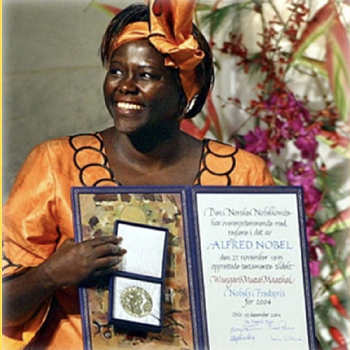The legacy of Wangari Muta Maathai (1940–2011) continues to inspire globally, marking her as one of Africa’s most influential figures in environmental and political activism. Maathai, who would have celebrated her 85th birthday this year, was a woman of historic firsts: the first woman in East and Central Africa to earn a doctorate degree, Kenya’s first female professor, and the first African woman to be awarded the Nobel Peace Prize.
Born in rural Kenya in 1940, Maathai excelled academically, earning a scholarship to study in the United States as part of the “Kennedy Airlift.” She later obtained a Ph.D. in Veterinary Anatomy from the University of Nairobi in 1971. A few years later, she was appointed Chair of the Department of Veterinary Anatomy, becoming the first indigenous woman in the region to hold an Associate Professorship at the university.
Her intellectual journey quickly translated into groundbreaking action. In 1977, she founded the Green Belt Movement (GBM), a grassroots organization that focused on empowering women through environmental conservation.
- The Power of a Seedling: The GBM’s core mission was to address the immediate needs of rural women who reported that deforestation was causing streams to dry up, increasing food insecurity, and forcing them to walk further for firewood.
- Tree Planting for Empowerment: Maathai’s simple, holistic solution encouraged women to plant trees. This practical action helped to bind the soil, store rainwater, and provide food and fuel, simultaneously serving as a vehicle for civic education and community empowerment. To date, the movement has been responsible for planting over 51 million trees across Kenya.
Maathai’s environmental activism was inextricably linked to her fight for democracy, human rights, and good governance. Her campaigns often put her in direct conflict with the authoritarian regime of the time. She publicly and successfully protested against the illegal privatization of public land and the attempted construction of a skyscraper in Nairobi’s Uhuru Park. Despite facing threats, harassment, and imprisonment, she never backed down.
In 2004, Wangari Maathai was awarded the Nobel Peace Prize. The Norwegian Nobel Committee specifically commended her for her “contribution to sustainable development, democracy and peace.” She was the first laureate selected primarily for activities focused on environmental sustainability, underscoring her holistic approach: that responsible governance of the environment is impossible without democratic space and human rights.
After her country’s democratic transition, Maathai was elected to Kenya’s National Assembly in 2002 with an overwhelming majority and served as the Assistant Minister for Environment and Natural Resources until 2005. She passed away in 2011, leaving a monumental legacy that continues to champion the principle of “thinking globally and acting locally.”







